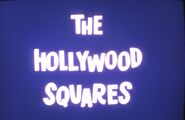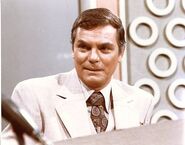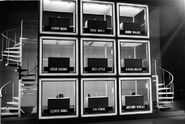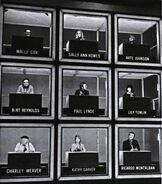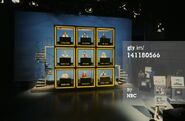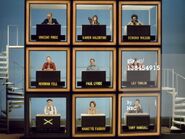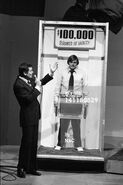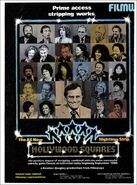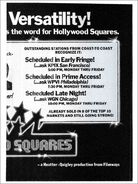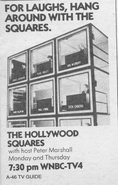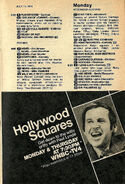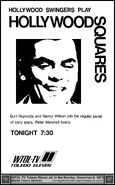| Aired | |
| NBC Daytime, Monday October 17, 1966-Friday June 20, 1980 NBC Nighttime, Friday January 12-September 13, 1968 Nighttime & Daytime Syndicated, Monday November 1, 1971-Friday June 12, 1981 | |
| Run time | |
| 30 Minutes | |
| Host | |
| Peter Marshall (The Master of "THE HOLLYWOOD SQUARES") | |
| Announcer | |
| Kenny Williams | |
| Origination | |
| NBC Studio 3, Burbank, California (1966-1980); Versailles Theatre, Riviera Hotel, Las Vegas, Nevada (1980-1981) | |
The Hollywood Squares is based on the classic children's game of tic-tac-toe with nine celebrities in their boxes.
Formats[]
Although there have been variations over the years in the rules of and the prizes in the game, certain aspects of the game have remained fairly consistent.
Two contestants, one usually a returning champion, almost always a woman playing Os/naughts (called circles in the show) as Miss Circle and a man playing Xs/crosses as Mr. X by took turns picking a star and following the traditional tic-tac-toe/naughts-and-crosses strategies for which square/star to select/pick. The star was asked a question and gave an answer. The contestants had the choice of agreeing with the star to be right or disagreeing if they thought the star is bluffing to be wrong. If the contestant's right, he or she got the square; if the contestant's wrong, the other contestant got the square, unless that caused the opponent to get three stars in a row. In that case, the opponent had to win the square on his or her own. A contestant could also win by capturing five squares on the game board, thus preventing draws/ties.
NBC Daytime Version[]
The daytime version uses the "rollover/straddling" format, that means the show can end with a game still in progress and had to be continued/finished on the next show.
Two contestants (one a returning champion, the other the challenger) played a best 2-out-of-3 game match with each game worth $200 for a total of $400/match win. But when the show started, each game was worth $100 and winning the match was worth $300 more for a total of $500. The first game of every show (unless it was an unfinished game in progress) was always a secret square game.
The secret square was a progressive jackpot prize package which started at about $1,000 {for the broadcasts of 1966} with another prize added each day when it's not claimed {from 1967 to 1980}; by the late 1970s, new Secret Square jackpots generally started in the $3,500-$4,500 range.
There was also a slightly different tie game rule in the Marshall version, than existed in the later versions (first player to earn five squares). A player only won a game, without getting three in a row, by earning squares sufficient to shut out their opponent from possibly getting three in a row. In most cases, this was achieved by earning five squares, but it's mathematically possible to earn as many as six squares, without getting three in a row, and still not shutting out the opponent from potentially getting three in a row (specifically, a player can get three diagonal squares even after the opponent has already earned the other six squares; this occurred at least one time in the history of the show). The player still needed, in this version of the show, to earn that shutout square themselves.
Starting in September 1976, the winner of the match picked a star for a prize; each star had an envelope with a prize inside with the big prize being $5,000, whoever the winning player chose won the prize inside that envelope.
Champions stayed on the show until defeated or if they won five matches at which point they won a bonus; from 1966 to 1976 the bonus prize was a brand new car, but in the final years of the daytime version from 1976 to 1980, the bonus was upped to $5,000, two new cars (later $10,000 and one car) and a luxury trip, for a total of over $25,000.
In the final episode of daytime series (which by that point had an altered contestant area and new theme music), the contestants playing that day were tied one game apiece, but there wasn't enough time to play a tiebreaker game. So to make up for it, both contestants won an additional $200 and each selected a star and won a prize for their troubles. Then after the final commercial break, the Hollywood Squares staff gathered around the contestant area for one last goodbye.
Nighttime/Syndicated Version[]
The nighttime version was much different, for it uses the self-contained format which became standard on future versions of the show. It aired on both NBC and in syndication. Two contestants played the game for the entire show and each completed game was worth $250 ($300 on NBC).
In addition, multiple Secret Square games were played on each show, each with different prize packages attached to them. On the NBC nighttime version, the Secret Square was played in the first two games, with different prizes per game; like on NBC, if the first Secret Square prize was not claimed in the first game, it carried over to the second game, and then if not won in the second game nothing was won. On the syndicated version, during the first two seasons, there were two such games, valued generally from $2,000 to $3,000; if the first Secret Square prize package was not claimed in the first game, it carried over to the second game, and then if not won in the second game nothing was won. From the third through seventh seasons (1973-1978), the first three games were Secret Square games with package values ranging from $2,500 to more than $7,000 (at least once topping $8,000) and did not carry over to other games if not won. The eighth and ninth seasons had Secret Square games in the second and third games, again with prize values of $3,000 to more than $7,500. The Secret Square game was not played in the final season.
Should time run out in the middle of a game (signified by an annoying loud horn aka The Tacky Buzzer), the contestants were awarded $50 for every square captured to their score. The player with the most money at the end of the show won the following:
- Seasons 1-7: A new car
- Chevrolet Vega - Seasons 1 & 2
- Pontiac Astre - Second Half of Season 4, 5 & 6
- Datsun B-210 - Second Half of Season 4, 5, 6 & 7
- Datsun F-10 - Season 6
- Pontiac Sunbird - Season 7
- Seasons 8-9: The daytime version's "choose a star, win a prize" game. Unlike the daytime version, where prizes under $500 were mixed in with that version's top $5,000 prize, every prize was worth over $5,000; the top prizes were the cash and a new car (usually, either the Sunbird or a Datsun 200SX), and often a luxury vacation and other gifts (such as furs or, in one show, an "investment diamond") were offered.
If the match ended in a tie, one final question was played with the star of one contestant's choosing; if the contestant can agree or disagree correctly, he/she won the match; otherwise, the match went to the opponent. In the event a contestant should finish with nothing, that contestant still won $100.
During the later years of the run, Merrill-Heatter Productions offered a substantial prize package for all contestants, win or lose.
1980-1981 season[]
For the final season, which debuted in September 1980 as a five-day-a-week series, the show moved to the Riviera Hotel and Casino in Las Vegas, Nevada. In addition to the elimination of the Secret Square game, there were no cash prizes at stake for each game; instead each game won a prize package, and players who won the most games when time expired won a bonus prize (usually, an exotic trip and other gifts), plus qualified to compete in a season-ending tournament. If the show ended during a game, the player with the most squares won the prize for that game.
Eric Lloyd Scott won the tournament final and a $100,000 prize package ($20,000, a Coachmen 17.5' Travel Trailer, a Domes America dream home, a Buick Riviera coupe, a 52-day ocean cruise and a Midas Midavan RV).
| This page uses Creative Commons Licensed content from Wikipedia (view authors). |
End-of-Show Disclaimers[]
"Celebrity panelists are briefed in advance." - (1966-1969)
"Areas of questions and possible bluff answers are discussed with the celebrities in advance. In the course of their briefing, actual questions and answers may be given or discerned by the celebrities." - (1969-1971)
"The areas of questions designed for each celebrity and possible bluff answers are discussed with each celebrity in advance. In the course of their briefing, actual questions and answers may be given or discerned by the celebrities." - (1971-1975)
"The areas of questions designed for the celebrities and possible bluff answers are discussed with some celebrities in advance. In the course of their briefing, actual questions and/or answers may be discerned by the celebrities." - (1975-1979)
"The areas of questions designed for the celebrities and possible bluff answers are presented to some celebrities in advance. In the course of this presentation, actual questions and/or answers may be discerned by the celebrities." - (1979-1980)
"No actual questions or answers are given to any celebrities. The areas of some questions designed for the celebrities and possible bluffs are discussed with some celebrities. During this presentation, some correct questions and/or answers might be discerned." - (1980-1981)
Trivia[]
At one time, the entire set was shaken by an earthquake. Everybody left the studio except for Paul Lynde, who stayed put in his square.
This was the one & only version of Squares that did not feature a bonus round, 48 years later, its short-lived spinoff, The West Virginia Squares also did that as well.
International Versions[]
Main Article: The Hollywood Squares/International
Merchandise[]
Board Games[]
Watkins-Strathmore (1967-68)[]
Ideal (1974)[]
Milton Bradley (1980)[]
Cancelled Merchandise[]
Video games based on the 1966-81 version were going to be made for the Atari 2600, ColecoVision and Mattel's Intellivision by The Great Game Company in 1983, but due to the North American Video Game Crash that year, the projects were cancelled before getting off the ground.
Photos[]
Titlecard[]
Game Board[]
The $100,000 Money Machine[]
Ads[]
Tickets[]
Review[]
Stations[]
These are some of the stations that did carry the original 1971-81 syndicated version of "Hollywood Squares."
New York - WNBC, WABC-TV, WPIX
Los Angeles -KNBC, KABC-TV. KTLA
Chicago - WMAQ-TV, WLS-TV, WGN-TV
Philadelphia - WPVI-TV
Birmingham - WBRC
San Diego - KCST-TV (and now KNSD)
Washington, DC - WRC-TV, WDCA-TV
Milwaukee - WTMJ-TV
Rhinelander/Wausau - WAEO-TV (and now WJFW-TV)
Green Bay - WFRV
Marquette, MI - WJMN-TV
La Crosse - WKBT-RV
Rockford - WCEE-TV (and now WIFR-TV), WQRF
Fargo - KTHI (now KVLY-TV)
Minneapolis/St. Paul - KSTP-TV, KMSP-TV
Detroit - WWJ-TV (and now WDIV), WKBD-TV
Des Moines - KCCI (and then KRNT-TV)
Boston - WNAC-TV-WNEV (and now WHDH-TV), WSBK-TV
West Palm Beach - WPEC
Orlando/Daytona Beach/Melbourne - WFTV
Lancaster/Harrisburg/York/Lebanon - WGAL
Pittsburgh - WTAE-TV
Fort Worth/Dallas - KXAS-TV (and then WBAP-TV) , KTXA
Fresno - KFSN-TV
Bakersfield - KERO-TV
Cincinnati - WLWT
Atlanta - WAGA-TV
Macon - WMAZ-TV
Omaha - KMTV
Lincoln - KOLN
Grand Island/Hastings/Kearney - KGIN
Cleveland - WKYC-TV
St. Louis - KTVI
Kansas City - WDAF-TV
Columbia/Jefferson City, MO - KCBJ-TV (now KMIZ-TV)
Evansville/Henderson/Owensboro - WEHT
South Bend/Elkhart - WNDU-TV
Indianapolis - WRTV (and then WFBM-TV), WTHR (then WLWI)
Fort Wayne - WANE-TV
Winston-Salem/Greensboro/High Point - WXII-TV * (and then WSJS-TV)
Charlotte - WCCB-TV
Greenville/Spartanburg/Anderson, SC/Asheville, NC - WFBC-TV (now WYFF)
Spokane, WA - KREM
Louisville - WLKY-TV
Lexington/Frankfort, KY - WLEX-TV
Albuquerque/Santa Fe - KGGM-TV (now KRQE)
El Paso/Las Cruces - KTSM-TV
Grand Rapids - WZZM-TV
Onondaga/Lansing/Jackson - WILX-TV
Denver - KCNC-TV (and then KOA-TV), KWGN-TV
San Francisco/Oakland/San Jose/Berkeley - KPIX, KTVU
Sacramento/Stockton - KCRA-TV, KXTV, KTXL
Eugene, OR - KVAL-TV
Portsmouth/Norfolk/Newport News/Virginia Beach/Hampton - WAVY-TV
Petersburg/Richmond - WXEX-TV (now WRIC-TV)
Salt Lake City - KTVX-TV (and then KCPX-TV)
Miami/Fort Lauderdale - WSVN (and then WCKT)
Sioux City, IA - KTIV
Cedar Rapids - KWWL
Sioux Falls - KELO
Tucson - KVOA, KOLD-TV
Phoenix - KOOL-TV (now KSAZ-TV), KTAR-TV (now KPNX), KPHO-TV
Oklahoma City - KTVY (then WKY-TV & now KFOR-TV)
Wichita, KS - KARD (now KSNW)
Sherman/Denison, TX/ Ardmore/Ada, OK - KXII-TV
Amarillo - KFDA-TV
Montgomery, AL - WSFA-TV
Episode Status[]
See Also: The Hollywood Squares/Episode Guide
Video[]
See Also[]
Storybook Squares
The Match Game-Hollywood Squares Hour
Hollywood Squares (1986)
Planet Hollywood Squares
Hollywood Squares (1992 proposed revival)
Hollywood Squares (1998)
Hollywood Squares (2015 proposed revival)
Hip Hop Squares
Hip Hop Squares (2017)
Nashville Squares
Celebrity Squares
Links[]
The Hollywood Square Website from 1966 to 1981 on NBC-TV & Syndicated
The Hollywood Squares Go Country In 1980
THE HOLLYWOOD SQUARES (1966) Page on TV.com










